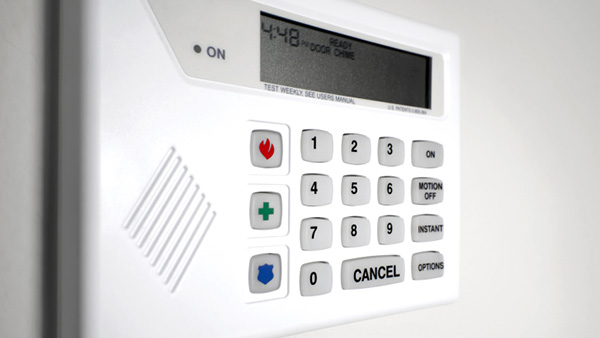
Consider a monitored fire alarm system.
We know that functional smoke detectors can save lives and protect property, and every home should have them installed. But a monitored fire alarm system can offer additional property protection and benefits. Starting at about $100, the equipment can be surprisingly affordable and effective, and the monthly monitoring fee can be worth the expense in peace of mind and far offset the expense of a loss. An alarm system can offer:
- Faster response time from authorities
- Notification of events when away from your home
- Possibility of lower insurance premiums
Alarms in a monitored system are transmitted to a constantly attended location typically using either cellular phone or landline telephone communications, and the appropriate responders are notified. The preferred method of monitoring uses a dedicated phone line with cell phone backup. Although this is not required for residential systems, it adds a level of redundancy. When determining the type of system you want to use in your house, it’s important to know the pros and cons. While there are many alarm manufacturers, there are only two types of systems:
- A hard-wired system offers greater reliability but tends to be more expensive and difficult to install. The main control panel should be located in a hard-to-reach area of your home, such as an interior closet. This arrangement makes it more difficult for an intruder to disable.
- Wireless technology provides all the detection benefits of a hard-wired system without the difficulty of installing electrical conductors throughout your home. The disadvantages of a wireless system include maintaining batteries in all peripheral devices, frequency interference, and accessibility to vital equipment by intruders.
What to consider:
- With any installation, be sure to follow your local fire and building codes. If wired-in smoke alarms are required, be sure to include that feature.
- It’s crucial that your system maintain communication with the alarm monitoring company. The National Fire Alarm and Signaling Code requires that systems “poll” the monitoring station every 30 days. Does the alarm company keep records of the connectivity attempts? It should!
- Is your system being installed by a state licensed contractor? If the salesperson’s best friend’s brother is doing it at a discount, you may want to think twice. Improper installation is a more common problem than equipment failure.
- Do you plan to disconnect your landline phone service in the future? If so, be sure to discuss this with your alarm monitoring service to make sure a wireless backup system is in place.
- Fire and burglar alarms are the most common installations, but for a nominal additional cost consider adding carbon monoxide detectors, water leak sensors and low temperature monitoring devices. Motion detectors, exterior cameras, remote access and light controls are added bonuses that may also incur added costs.
Most states’ requirements for residential alarm systems are not as stringent as those for commercial buildings, so buyer beware. Purchase your system from a reputable company familiar with requirements in your location. Ask for references or consider referrals from someone you know and trust.
This loss control information is advisory only. The author assumes no responsibility for management or control of loss control activities. Not all exposures are identified in this article.
